We’ve all felt the pain of struggling through maths problem after maths problem, and the harder we try, the more frustrated we get. Usually, this ends with us just reminiscing back to the goold old primary school days, when the hardest thing we had to do was long division.
Although we might often wish that all our work would magically become easier, we actually learn a lot more when we’re challenged.
This article is going to explore the science behind why your learning should challenge you. We’ll break down concepts like productive failure and desirable difficulties, as well as how you can tell that you’re working at the right level.

The Good Side of Difficult Learning
Even if completing tricky questions sucks at the time, you’ll get the most out of learning if you’re consistently being challenged. Don’t believe us? Fair enough. Still, we reckon we can convince you that challenging yourself is totally worth the payoff.
Without further ado, here are some of the ways that harder questions can make us better students!
Engagement and deep learning
Humans are naturally good problem solvers, but we also like things to be as simple as possible. When it comes to our learning especially, we tend to prefer the quickest way out. (For example, we’ve all had those days where all we do is copy the answers right out of our maths or science books.)
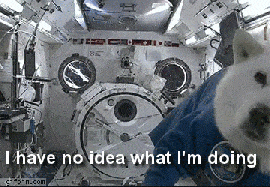
As you probably know, though, the easy route isn’t going to help us gain anything from our learning. As problem solvers, our brains are much more active when we find things hard because we have to engage more to find a solution. That mental exertion leads to a little something that the Association for Talent Development calls “deep learning”.
Basically, when we engage in deep learning, we’re learning to retain information for important stuff – you know, like your exams. On top of that, deep learning helps us to apply what we’re learning to information we already have. This is a real benefit to us, as it allows us to make crucial connections and understand the content inside and out.
This is super important when it comes to writing any kind of assessment, be it an internal or an exam. If all you’ve understood is the surface-level concepts that you learned when your teacher first explained it, you’re likely going to struggle, because you won’t remember it nor understand it enough to write about it.

Even more importantly, this skill of engaging mentally with challenging work is exactly the type of thing that remains useful after you leave school. Whether you’re heading into tertiary education, trades, or the workplace, being able to learn and apply what you’ve learnt is going to be super useful for picking things up fast.
Productive Failure
Throughout your life, you’ve probably been encouraged to focus on success. We’re all part of a success-based society whether we like it or not. Unfortunately, this is especially true in high school, where we’re constantly being pushed to excel on all the assessments.
As students, we tend to prioritise success over all else, so finding things difficult usually just feels frustrating. But as it turns out, failing can actually be super helpful to facilitate your learning.
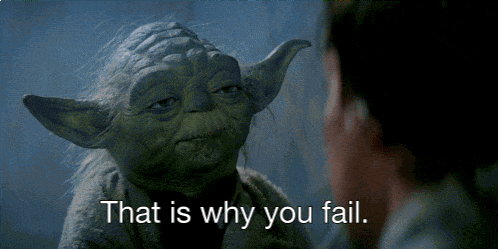
Let’s discuss why.
Manu Kapur from the National Institute of Education in Singapore conducted an experiment with two groups of students. One group got help from teachers to correctly answer questions while the other group got no help from teachers and was encouraged to try and come up with answers by working together. Unlike the first group, the second group never got the correct answers.
When Kapur later tested the students, he found that those in the group who didn’t have help performed much better than those who worked with the teachers initially. Kapur theorises that the difficulty encountered in the fail-first group had helped them to learn the content better, so when they were taught, they learnt it on a much deeper level.
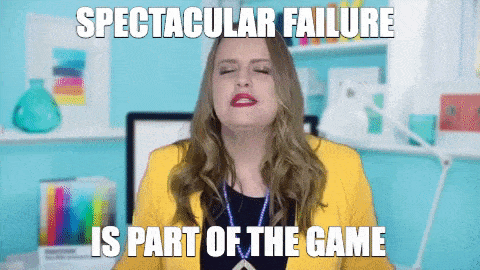
Kapur calls this productive failure because the students failing initially gained more benefits from their learning. He says that failure is useful to us in letting us know what’s working and what’s not, and is a great tool for noticing important ideas. We’re inclined to agree.
Too long, didn’t read – succeeding right from the get-go isn’t going to aid in comprehensive learning. So, next time you’re introduced to a topic for the first time and you’re thinking “what in the world?”, don’t panic! Sit down with some friends, remember that hard is good, and see what you can figure out on your own.
Desirable Difficulties
Facing challenges in your learning is not only a great way to learn the content in a more effective way, but it can also help you actually remember what you’ve learned.
This brings us to psychologist Robert Bjork, who has done quite a bit of research into what he dubs “desirable difficulties”. This refers to certain study techniques we can use that will make revising harder, but will ultimately create better learning overall. Some of these desirable difficulties include:
- Spacing out your study session so that there are larger gaps between them – this often makes it harder to remember the content
- Testing yourself on the content
- Mixing up the context or the conditions that you’re learning in – for example, making flashcards vs writing practice questions
- Generating your own answers rather than paraphrasing or copying
For most of us, doing any of the above will make our study take so much longer, and our brains will be working a lot harder than they would be if we were just rereading notes. However, Bjork’s research shows us that this is totally worth it – desirable difficulty is great for our memory and overall understanding!
Think of it like an investment – spend a little more time on your revision, and get lots back in return.
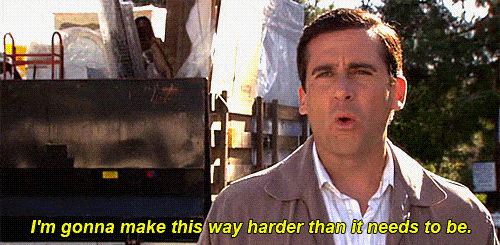
Added Bonuses
We’ve covered a few of the scientific reasons why finding your learning hard can be good for you, and we think we’ve put forward a pretty convincing argument.
But, if more productive learning and better retention isn’t enough to sway you, there are also a couple of added bonus skills that come from pushing through a particularly difficult piece of learning. Here are some of our favourites:
- Resilience
When you can’t solve something straight away, you’re building the magical skill of resilience. Resilience refers to the ability to push through and keep trying, even when things aren’t going your way. With everything life throws at us these days, having resilience is a key skill that employers are always on the hunt for. Not to mention, being persistent also makes us better learners, as we’ve already discussed. How good!
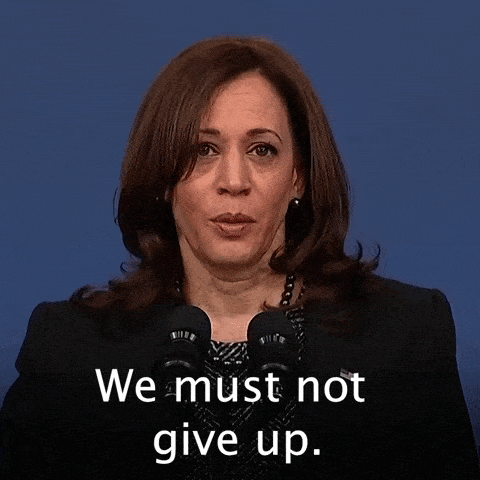
- Problem solving
By making yourself work on harder questions often, your brain will start to train itself to tackle difficult problems with confidence, which is a great asset to have. Great problem solvers will be able to push past that initial frustration, and will use their strong understanding of the content to find creative solutions for the problem. Of course, this is another skill that employers and universities are looking for.
- Appreciating failure
We talked earlier about how failing the first time around facilitates better learning, but there are also a few other good things about it, too. We encounter failure pretty often throughout our lives, so failing through learning is a good way to enhance your ability to deal with it. This also helps us to build what we call a growth mindset.
A growth mindset is when we’re able to see mistakes and failures as an opportunity to learn and improve. Thinking in this way is super important to becoming a better learner, as well as just helping you move forward in life.
Finding the Right Level of Difficulty
Learning should be hard, but it shouldn’t be so hard that you can’t achieve anything. It also shouldn’t be so easy that you’re not being challenged at all. Read on to learn what to look out for to know if the level you’re working at is right for you.
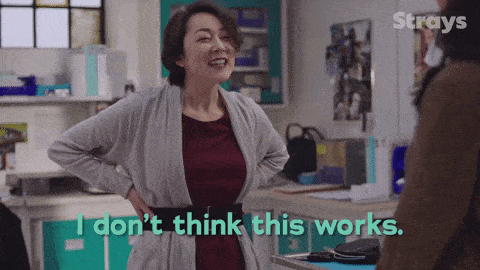
How to tell if things are too hard
Learning challenges should be hard, yet ultimately achievable. Finding things difficult beyond your capabilities isn’t going to help your learning, and will probably just discourage you, which no one wants.
That being said, finding the perfect balance between a good level of challenging and too challenging can be tricky. If you find any of these things apply to you, the level you’re learning at may be a little bit too hard.
- You’re feeling completely and utterly lost. You find yourself unable to follow things at all, and even when you reread concepts multiple times, all you’re hearing is gibberish. In addition to that, you also might not see any connections between things or how concepts link up to what you’ve previously learned.
- You’ve had the concept explained to you multiple times, by teachers, friends, and/or YouTube videos, but it’s not becoming any easier to understand.
- You’re never able to get any questions right. Getting questions wrong is a key part of fail-first learning, but getting questions wrong repeatedly with no sign of progress is not what we want. You should be able to answer some things, even if it’s a challenge.
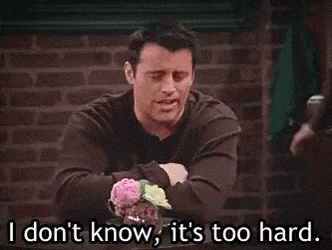
What to do when your learning is too hard
If you feel you’re running into quite a few of the problems we just mentioned, there’s a few things you can try.
The first option is to communicate your problems to your teachers. Let them know you’re finding things unreasonably hard, and ask them what concepts you can focus on to help yourself gradually work up to those harder concepts.
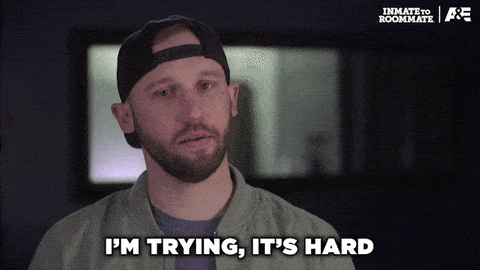
If you’re stuck with a real useless teacher, you can also just focus on the basics on your own. Try pulling out last year’s notes to study the background concepts, and make sure you’re building off of a strong foundation.
You can also use Google and YouTube to try and understand the base-level skills and big picture ideas. Once you’ve grasped these, you can slowly start to add increasing levels of difficulty, until you’re working at your goal difficulty.
How to tell if things are too easy
It might feel super nice to fly through your reports, maths problems, and essays, but this is far from ideal.
The big issue that stems from your learning being too simple is that you never really learn how to learn. Failure doesn’t just teach us about the content we’re learning, but it also teaches us how to learn independently and effectively. If we’re always getting E8s without much effort, we’re not going to know how to tackle those seriously challenging problems when we eventually run into them.
Needless to say, this is a major issue! This is especially true for students heading off to university, where learning is all about overcoming tricky problems (usually on your own).

If you think any of the following apply to you, then your learning level may be too easy for you:
- You never get stuck. You can fly through questions without too much brain power, and your answers are always right.
- You never ask for help, and it’s not because you’re shy. You never have to ask questions in class, and you barely ever have to use Google when completing assignments or revision.
- You get all your work done super quickly, without thinking much about what you’re actually doing.
What to do when learning is too easy
You might not want to put effort into your learning by making it harder but we promise it’ll be worth it. Who knows, you might even enjoy a challenge!
If you think you’re finding things too easy, try pushing yourself a bit further once you’ve finished your last task. Ask your teachers if there’s any extension work that you can complete, either in class time or just on your own. Search around to see what concepts you’ll be running into next year, and research them on your own to see what you can learn, too.

If you’re in NCEA level 3 – or if you’re a super dedicated level 2 student! – talk to your teachers about scholarship exams. These tend to focus on the same content you’ve been learning in class, it’s just assessed in a trickier way. Not to mention, they can earn you some cash, so they’re absolutely worth looking into.
Conclusion
To sum it all up, learning is never supposed to be easy and finding your learning hard is usually a good thing. That being said, you don’t want to be struggling to the point where you can’t answer any problems whatsoever. Challenges should be achievable and when they are you get the best of both worlds: richer learning and the satisfaction of succeeding.
Further Resources
- The Productive Failure study: https://www.opencolleges.edu.au/informed/other/the-benefits-of-learning-the-hard-way/
- Article about Desirable Difficulties: https://theemotionallearner.com/2019/09/06/why-learning-should-be-difficult/
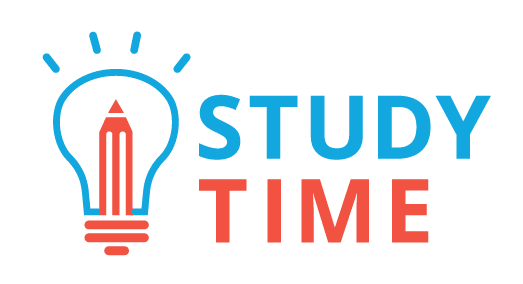
hi
Great article guys. Loved the added bonuses section as well as the productive failure section. Thank you very much
#slayqueen
#yougogirl
#nceaexams
#lowkeystressedout
#gonnagetexcellence
#scaredimnotgonnagetexcellence